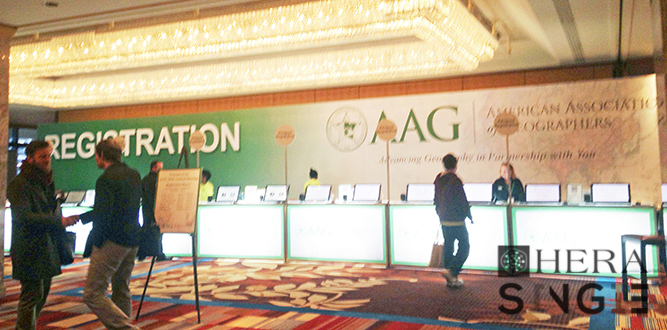
Report on Panel I & II: Gendering the City: Culture, Identity and Mobility in Global Perspective in American Association for Geographer’s Annual Conference 2016, San Francisco
Date: 29 March 2016
PI Dr. Melissa Butcher, and three of the SINGLE project’s PhD students presented their work at the Association of American Geographers (AAG) Annual Conference in San Francisco. Melissa Butcher and Kate Mclean (both of them from Birkbeck, University of London) put together two panels on the theme of “Gendering the City: Culture, Identity and Mobility in Global Perspective”. Answering recent calls in urban studies to shift the focus to lived experiences and practices, the panels presented a diverse range of case studies from across the globe. The first panel saw Dr. Alice Evans (University of Cambridge) talk about urban change and rural continuity drawing on her ethnographic work in Zambia and linking processes of urbanisation with changing gender ideologies and practices. Dr. Melissa Butcher presented her work on single, middle aged and middle class women in Delhi, highlighting the interlinkage between cultural tropes and affective responses to the city in the constant interplay of constraint and subversion. The SINGLE team’s PhD candidate Tsz Ting Ip (University of Amsterdam) spoke about her research with single migrant workers in Shanghai and the ways they construct home, juggling hard labour conditions, personal aspiration and the, at times, harsh requirements of the globalising city. Lucie Bernroider (University of Heidelberg) presented her PhD research for the SINGLE project exploring different spatialised cultural narratives that hamper young single women’s opportunities to live by themselves in Delhi. Weighed down by a lack of cultural legitimacy these women nevertheless closely interlace questions of personhood and lifecourse with their ongoing relationship to the city. Jamee Ernst (George Washington University) ended the panel with a look at Washington DC, contrasting perceptions of safety with incidents of reported harassment against women in public space, using statistical data to complicate our understanding of the formation of ‘landscapes of fear’.
The second session hosted talks by Kate McLean (Birkbeck), Rosie Cox (Birkbeck), Maddalena Chiellini (Birkbeck, also a PhD student in the SINGLE project), Aparna Parikh (Penn State University), and Oznur Sahin (University of Western Sydney). The five papers found a common thread in looking at how women’s engagement with the city spoke of larger social processes and cultural phenomena that, despite their locality, also shed light on national and transnational trends. McLean’s look at “chola bourgeoisie” used representations of wealthy indigenous women to investigate change in the social texture of two Bolivian cities, El Alto and La Zona Sur. Cox’s work with au pairs in London spoke of a distinct culture of employment, childcare and homemaking that creates demand for low-waged and yet highly skilled migrant workers. Chiellini’s analysis of women’s driving and riding practices in Delhi complemented Parikh’s discussion of female call centre employees’ nighttime commutes in Mumbai, with both papers underlining how gendered aspects of mobility are connected to understandings of women’s positions in Indian society. Finally, Sahin’s research in the Bagcilar district of Istanbul engaged with the role that transnational (UN and European Council), national and local authorities had in creating new spaces where women could engage in civic participation.
Drawing on women’s agency and everyday practices in different globalising and globalised cities, the panellists presented the precarious everyday lives of women, revealing the ways in which gendered urban spaces shape women’s cultural, spatial, and economic mobility. Exploring the way city spaces manifest gender norms and are built around heteronormative canons, the papers contested not only the level of safety for women in accessing the urban, but also the inequalities in spatial use in both private and public domains. The intensive panel discussions demonstrated a multitude of ways in which women of different age, class, marital status, and cultural background affectively respond to their specific locality and proactively negotiate with urban transformation and modernity in the age of globalisation.